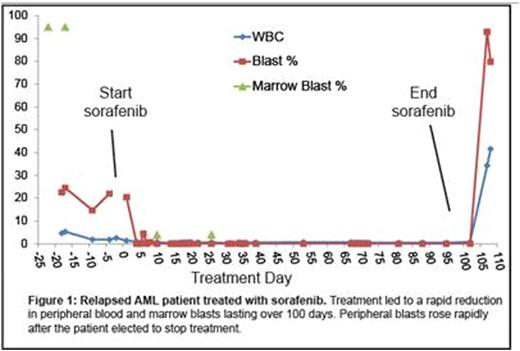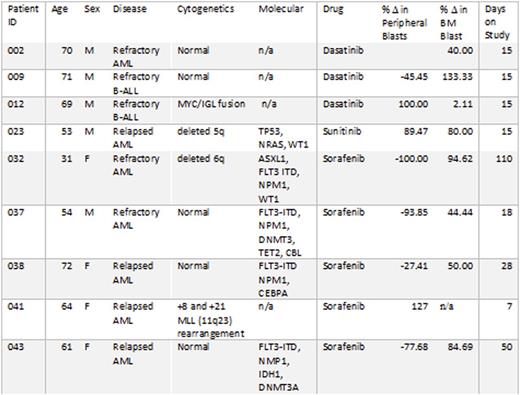Abstract
Despite improved understanding of molecular lesions in relapsed/refractory acute leukemia, outcomes remain dismal. Aberrantly activated tyrosine kinase signaling pathways play a critical role in the pathogenesis of acute leukemia. Identification of drugs that target the drivers of disease has the potential to improve treatment. We have developed an FDA regulated (IDE# G110198) in vitro kinase inhibitor assay that can identify potential therapeutic targets in primary acute leukemia samples and provide individualized treatment options in a clinically relevant time frame. We designed a Phase 2 clinical trial (NCT01620216) to validate the role of this pre-clinical kinase inhibitor screen for selecting effective individualized therapies.
After obtaining informed consent, peripheral blood or bone marrow is isolated using a ficoll-density gradient and plated with dose-escalating concentration gradients of five kinase inhibitors (nilotinib, dasatinib, sorafenib, sunitinib, and ponatinib). Cell line controls are used for each drug. Samples are deemed sensitive based on IC50 and comparison to the median of all samples tested in our laboratory (over 1000 primary samples to date). Patients who satisfy eligibility are treated with FDA approved dosing using the selected inhibitor.
Inclusion is limited to patients age ≥ 21 with relapsed/refractory acute leukemia (AML and ALL) and patients age ≥ 65 with a history of myelodysplasia who have developed AML, have failed hypomethylating agents, and are not candidates for standard induction. Only patients with samples that demonstrate in vitro sensitivity to 1 of the trial drugs are eligible. Additional eligibility includes: ECOG ≤ 2, adequate organ function, and no active GVHD. Cycles are 28-days. Marrow biopsy for response assessment and correlative studies is obtained on days 15, 28, and day 1 of subsequent cycles. The primary objective is to determine the clinical activity, defined as > 25% decrease in bone marrow blast counts. Secondary objectives include overall response (defined by the International Working Group), overall survival, and progression free survival. Correlative studies include high-throughput sequencing, expression profiling, correlation of target inhibition with clinical response, and PK analysis. The treatment approach is deemed worthy of ongoing study if clinical activity is observed in at least 4 of 24 patients.
43 patients have been screened with 12 demonstrating in vitro sensitivity. Nine have been enrolled on treatment. Median age is 64 (31-71) years with 5 males and 4 females. Two patients had ALL. The remainder had AML. Drugs utilized to date include dasatinib (n=3) and sorafenib (n=6). Of the three patients who exhibited in vitro sensitivity but were not enrolled, sensitivity to sorafenib, sunitinib, and dasatinib was seen. Clinical activity was seen in 4 subjects with AML -all treated with sorafenib- with median change in marrow blast in this group of 69% (44-95%). Median time on treatment for responding patients was 39 days (18-110 days). One subject with refractory AML who had failed allogeneic transplant had a 95% decrease in marrow blasts with prolonged disease control (Figure 1). Two patients were taken off study due to drug-related AEs (pancreatitis and diarrhea). No unanticipated AEs were seen.
Our in vitro kinase inhibitor assay identified potential therapies for the treatment of ALL and AML. Although the numbers are too small to draw any specific conclusions regarding response, the 4 responders were FLT3-ITD+ AML, a known target of sorafenib, and appear to have proliferative disease with higher baseline blast counts. The relatively small panel of available treatment drugs with overlapping target profiles may have contributed to the preferential treatment of patients with FLT3-ITD+ AML and to the significant screen fail rate. Our results using a larger panel of targeted agents have shown a high level of sensitivity to at least one drug. Accordingly, we are expanding the platform of clinically available targeted agents. The study continues to enroll patients with the goals of defining additional molecular abnormalities and optimizing assay characteristics, while prospectively testing the therapeutic potential of additional drugs. Correlative studies are ongoing. We have initiated another study using this assay to help select targeted therapies to be added to AML induction (NCT02779283).
Spurgeon:Gilead Sciences: Research Funding; Bristol Myers Squibb: Research Funding; Acerta Pharma: Research Funding; Genentech: Research Funding; Janssen: Research Funding. Maziarz:Incyte: Membership on an entity's Board of Directors or advisory committees; Athersys: Consultancy, Membership on an entity's Board of Directors or advisory committees, Research Funding; Novartis Pharmaceuticals Corporation: Consultancy, Membership on an entity's Board of Directors or advisory committees, Research Funding. Tyner:Janssen Research & Development: Research Funding; Inctye: Research Funding; Genentech: Research Funding; Constellation Pharmaceuticals: Research Funding; AstraZeneca: Research Funding; Leap Oncology: Consultancy; Agios Pharmaceuticals: Research Funding; Array Biopharma: Research Funding; Aptose Biosciences: Research Funding; Seattle Genetics: Research Funding; Takeda Pharmaceuticals: Research Funding. Druker:Agios: Honoraria; Ambit BioSciences: Consultancy; ARIAD: Patents & Royalties, Research Funding; Array: Patents & Royalties; AstraZeneca: Consultancy; Blueprint Medicines: Consultancy, Equity Ownership, Other: travel, accommodations, expenses ; BMS: Research Funding; CTI: Equity Ownership; Curis: Patents & Royalties; Cylene: Consultancy, Equity Ownership; D3 Oncology Solutions: Consultancy; Gilead Sciences: Consultancy, Other: travel, accommodations, expenses ; Lorus: Consultancy, Equity Ownership; MolecularMD: Consultancy, Equity Ownership, Patents & Royalties; Novartis: Research Funding; Oncotide Pharmaceuticals: Research Funding; Pfizer: Patents & Royalties; Roche: Consultancy.
Author notes
Asterisk with author names denotes non-ASH members.



